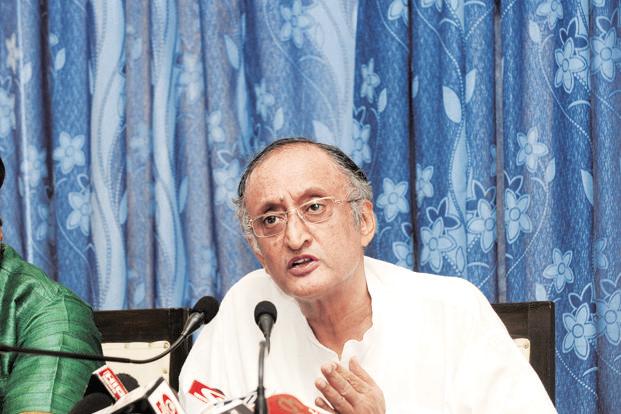Amit Mitra asks Centre to come clean on GST
Live mint
By Remya Nair
Tue, Nov 01 2016. 12 27 PM IST
In a letter to Arun Jaitley, West Bengal finance minister Amit Mitra says Centre concealed crucial information on service taxpayer base from states.

New Delhi: In another signal of the growing trust deficit between the states and the Centre on implementation of the goods and services tax (GST), West Bengal finance minister Amit Mitra has accused the Union government of concealing crucial information on the service taxpayer base from states.
While the states had so far been led to believe that the service taxpayer base was 1.1 million, new data supplied to the state finance ministers reveal that it is actually 3.05 million—almost thrice of what was assumed so far. This, Mitra argues, has unfairly influenced the discussions, especially on the sharing of administrative powers between the Centre and states.
Crucially, Mitra’s charges—contained in a letter addressed to finance minister Arun Jaitley—have been levelled just ahead of the crucial two-day meeting of the GST council beginning on 3 November. It could cast a shadow on the meeting, which has been convened to decide on the GST rate structure. If unresolved, it could also derail plans to roll out GST on 1 April.
The sharing of administrative powers between the Centre and the states for controlling traders and service taxpayers in a GST regime has been a point of contention.
After the first meeting of the GST council, it was concluded that the Centre will control all the existing 1.1 million service tax dealers. In the case of goods, it was agreed that goods traders with an annual revenue threshold of less than Rs1.5 crore would be administered by states and anything above jointly by the Centre and states.
However, in the second meeting of the GST council, the states demurred, claiming the minutes of the meeting did not adequately reflect what was discussed; this forced the council to go back to the drawing board on the administrative control of both goods and services.
The sharp revision in the service taxpayers base, just ahead of the fourth meeting of the GST council, is only going to worsen the disquiet the states have been evincing.
“The minutes of the 1st and the 2nd GST council meeting clearly records a tax base of around 1.1 million for service taxpayers,” Mitra wrote in a letter dated 28 October, before adding, “Suddenly, we find that the service taxpayers number has escalated to 3.05 million out of which 2.64 million are shown as active taxpayers.”
“This implies that the service tax base has grown 3 times over 2 years. What is even more surprising is that even a month ago this fact was not told to the states,” he wrote, adding that the figures seem an afterthought, surfacing only after the issue of dual control was discussed in the last GST council meeting held on 18-19 October.
Mint has reviewed a copy of the letter. Mitra and revenue secretary Hasmukh Adhia did not respond to e-mails seeking comment.
In his letter, Mitra also pointed out that the disaggregated data of value-added tax (VAT), excise and service tax base based on thresholds of Rs1.5 crore and Rs20 lakh had not been shared with the states so far. He also added that the states were likely to get the updated data on the taxpayer base only by 1 November, which left them only a day to deliberate before the GST council meeting. The data shared with states by the GST council secretariat was updated as of 19 January 2016.
Mitra’s letter comes close on the heels of Kerala finance minister Thomas Isaac expressing concerns over the rate structure and the tax rates under GST as well as the proposal to impose a cess over and above GST on certain items to compensate states as proposed by the Centre.
The Centre is hoping to finalize the tax rates and slabs, the issue of dual control as well as draft central GST and the integrated GST legislation in the next three weeks. The central government is targeting to push through the central GST law and the integrated GST law in Parliament in the upcoming winter session.
“In a dual GST model, dual control is inherent. States may find it difficult to monitor service tax assesses since they have never levied service tax till now,” said S.D. Majumder, former chairman of central board of excise and customs. “They may need the support of the Centre at least in the initial years,” he said.